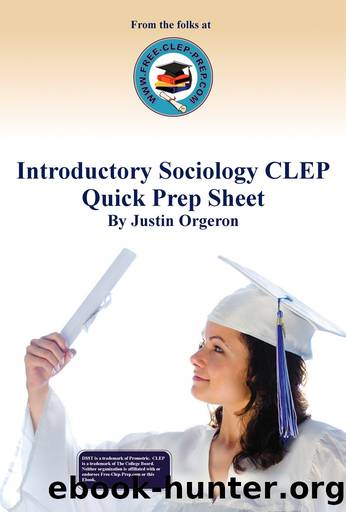Introductory Sociology CLEP Quick Prep Sheet by Justin Orgeron

Author:Justin Orgeron
Language: eng
Format: epub
Tags: Exam, DSST, CLEP, Sociology
Publisher: Justin Orgeron
Published: 2013-07-22T00:00:00+00:00
Inequality and Prejudice
Achieved Status â Achieved status is status that is earned through merit or achievement. This is in contrast to ascribed status.
Ascribed Status â Ascribed status is status that is inherited. Religion is often considered an ascribed status because it is inherited from our parents. If your parents are Christian, it is very likely that you are Christian. Likewise, if your parents are Islamic, it is very likely that you are also Islamic. The caste system seen in Hinduism is an example of an ascribed status system. This system does not take merit into account, but gives an individual status depending on their family of birth.
Horizontal Mobility â Horizontal mobility is the change of location or move to a similar job. In horizontal mobility, your social position does not change, only its location. An example of this would be leaving a job as a computer salesman at one company and taking a similar job with another company.
Intergenerational Mobility â Intergenerational mobility is the ability of the parent generation to confer some benefit or wealth to their children which results in their child moving upwards on the social ladder. Note that it has to be the childâs generation which experiences the mobility, and not the parent.
Intragenerational Mobility â Intragenerational mobility is upward mobility on the social ladder that occurs in a single generation. An example would be immigrants who move to a new nation, and start out poor but successfully build a business and become rich within their lifetime.
Social Stratification â Social stratification is the separation of people into different social groups based on socioâeconomic conditions. For example, in the United States, 3 basic layers exist: lower class, middle class, and upper class. Karl Marxâs theory on social stratification delineated two groups: the owners of productive property, and the laborers. Essentially, the ruling class owns the ability to produce, whereas the working classes have only their own time and energy that generates income.
Proletariat â The proletariat are the laborers in a society, who own little or no means of production. On the other hand, the bourgeoisie are those who have the power and wealth, and are considered the upper class.
Open/Closed System of Social Stratification â An open system of social stratification means that it is possible for a person to improve their social class in society. The United States is an example of such a system, as with hard work it is possible to move from Poverty to Upper Class. This is in contrast to a closed system of social stratification, in which movement beyond your current social class is extremely difficult/almost impossible. The caste system in India is one example of such a system, though there are many countries in the world where the same holds true due to lack of education opportunities.
Exchange Mobility â The concept that there must be a person who moves down the social ladder for every person who moves up is called exchange mobility. This concept is not rigid in nature however, but only applies in general.
Download
This site does not store any files on its server. We only index and link to content provided by other sites. Please contact the content providers to delete copyright contents if any and email us, we'll remove relevant links or contents immediately.
Deep learning with TensorFlow and Keras by Derrick mwiti(902)
Understanding PDA Autism in Kids: A Guide for Parents and Teachers to Support Neurodiverse Learners by Jehu Len(836)
The Victorian Era: A Captivating Guide to the Life of Queen Victoria and an Era in the History of the United Kingdom Known for Its Hierarchy-Based Social Order by Captivating History(612)
Writing Solid Code: Development Philosophies for Writing Bug-Free Programs by Steve Maguire(532)
100 Ideas for Secondary Teachers: Engaging Parents by Janet Goodall & Kathryn Weston(511)
Intersectionality in Educational Research by Dannielle Joy Davis; James L. Olive; Rachelle J. Brunn-Bevel; Susan R. Jones(506)
How to be assertive in any situation by Hadfield Sue & Hasson Gill(500)
Brain Teasers to Build Critical Thinking Skills: Brain Exercises for Tech, Banking, Case Interview Prep, and to Keep Your Mind Sharp by Kris Safarova(487)
Brain Teasers to Build Critical Thinking Skills by Safarova Kris(483)
Python 101 - Fundamentals by Sam(452)
Critical Curriculum Leadership : A Framework for Progressive Education by Rose M. Ylimaki(444)
The Art of Emotional Validation: Improve Your Communication Skills and Transform Your Relationships by Validating Emotions and Feelings by Emily Wright(414)
A Beginner's Guide to SSD Firmware by Unknown(401)
The Knights Templar: An Enthralling History of the Rise and Fall of the Most Influential Catholic Military Order by Wellman Billy(400)
NumPy : From Basic to Advance by bisht Karan Singh(398)
The Future Knowledge Compendium by Ellyard Peter;(388)
Alma Maters (5th edition) by Unknown(388)
What Every Teacher Should Know about Learning, Memory, and the Brain by Tileston Donna E. Walker;(386)
Make wealth from intraday trading by Maddy MADDY(375)
